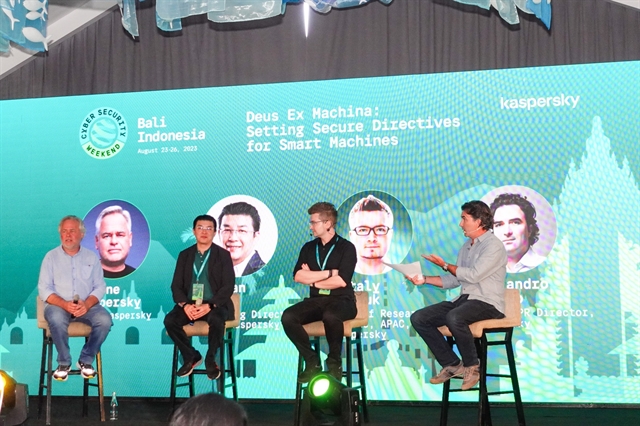 Economy
Economy

 |
| Speakers at a conference titled “Deus Ex Machina: Setting Secure Directives for Smart Machines,” organised on Thursday in Bali, Indonesia. — VNA/VNS Photo Bồ Xuân Hiệp |
Bồ Xuân Hiệp
BALI — International cooperation is needed to enhance cyber immunity and create a secure digital world, experts said at a conference on Thursday in Indonesia.
Speaking at the meeting, Eugene Kaspersky, CEO of Kaspersky, the event’s organiser, said cybercriminals do not adhere to national or geographic boundaries, making it essential for countries to have cybercrime laws in place.
It’s vital for countries to have the legal authority to assist foreign countries in investigations, even if they have not suffered any damage themselves, he said.
“By establishing international guidelines for combating cybercrime, the process of digital investigations involving multiple countries can be streamlined, eliminating regions where cybercriminals can escape the reach of national laws,” he said.
The concept of cyber immunity centres around implementing a level of protection that makes attacking a company more costly than the potential benefits, according to Kaspersky.
“It is impossible to guarantee 100 per cent protection in the current IT landscape, where everything is vulnerable to hacking,” he said.
The key is to make attacks financially unprofitable for potential criminals, according to Kaspersky.
Kaspersky recently trademarked their approach, known as Kaspersky Cyber Immunity, which aims to create virtually invulnerable solutions and minimise potential vulnerabilities.
The cyber immunity approach separates the IT system into isolated parts and controls the interactions between them, making most attacks ineffective and allowing the system to continue performing critical functions even in aggressive environments, thus stopping potential attackers in their tracks.
“In an age where technology can be used by good guys and bad guys alike, traditional cybersecurity is no longer enough. We need to revolutionise our defences to ensure we create a more secure digital world,” he noted.
AI and cybersecurity
The conference also discussed the intersection of artificial intelligence (AI) and cybersecurity.
AI has emerged as a powerful tool in the field of cybersecurity and beyond, experts said. The arrival of ChatGPT at the end of 2022 sparked debates on AI’s tangible effects and its potential to disrupt industries globally.
Noushin Shabab, senior security researcher for Asia Pacific Global Research and Analysis Team, said while AI has proven to be a powerful tool in various fields, including cybersecurity, it can also be exploited by cybercriminals for advanced persistent threat (APT) attacks.
AI can assist cybercriminals in various stages of a sophisticated cyberattack, from reconnaissance to data exfiltration, she said.
To counter these AI-assisted APT attacks, experts recommended implementing advanced security solutions, keeping software updated, providing employee training on cybersecurity best practices, and enforcing multi-factor authentication for critical systems.
Adrian Hia, managing director for Asia Pacific at Kaspersky, emphasised the growing awareness of leveraging AI for business benefits in the APAC region.
He pointed out that AI spending in the region is expected to double in three years, indicating a promising future for AI implementation.
However, he stressed the importance of prioritising cybersecurity alongside AI adoption to ensure its advantages are enjoyed without compromise.
With the exponential growth of internet-connected devices, cyber threats have become more prevalent than ever, experts warned.
The conference titled “Deus Ex Machina: Setting Secure Directives for Smart Machines,” was organised by Kaspersky, a global cybersecurity company founded in 1997 in Russia.
The company has signed agreements with various countries, including Việt Nam, to provide solutions to protect against cyber threats. — VNS




